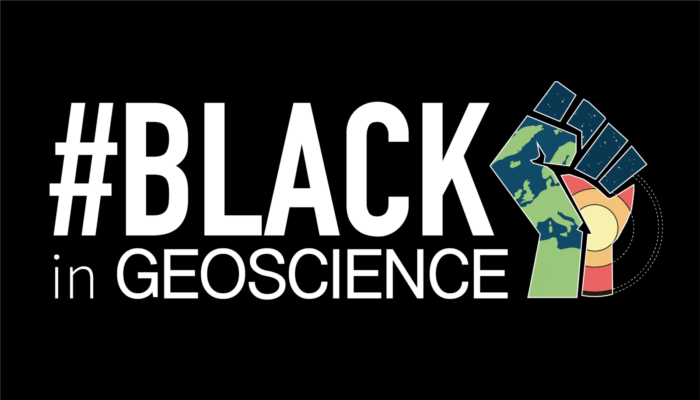
The last few weeks have been filled with devastating news – harrowing stories about the police killing black people. Racial inequalities and discrimination go far beyond current events. In science in general, and in the geosciences in particular, little progress has been made regarding diversity over the past few decades. This is both the result of deep-seated institutional racism (sometimes referred to as systematic racism), and a general reluctance to openly discuss race-related inequality and discrimination even with those closest to us (family, colleagues, friends), avoided for being uncomfortable conversation topics. Now more than ever, being silent and inactive are not an option.
You might be thinking: are there any black scientists in geodynamics at all? And this is exactly the problem. There are not that many. In fact, there are way too few; we all know academia is still predominantly white and male.
In this blog post we highlight some exceptional researchers in geodynamics and adjacent disciplines who do amazing research as PhDs, postdocs, professors and professionals and who just happen to be black. So next time, you can proudly proclaim that – yes – there is #BlackInGeodynamics! and #BlackInGeoscience (just not nearly enough as of yet).
The scientists
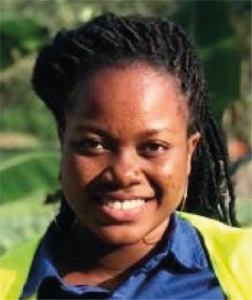 Rebecca Ebe Ohemeng Appiah @ReccaEbe
Rebecca Ebe Ohemeng Appiah @ReccaEbe
Hi there! I’m a final year geological engineering student at KNUST, Ghana set to graduate June 2020. I’m currently offering electives in ground engineering and petroleum geology. My final year project work is on ‘The use of sirovision technology in mapping geological structures for rock slope stability’. My group did a case study at a mine here in Ghana where we mapped an entire southern section of a pit wall to determine the kinematically possible failure modes and we have made our recommendations. I am very enthused with geology and seek to further my knowledge in geotechnical engineering/engineering geology and work in a mine. I am motivated to remain one of the few women in this field and be a reason many other women would want to do same and more. I’m currently completing exams and assignments online towards the end of my final semester, undergrad. I’m also running a doughnut haven and guess what, garnishes are geology inspired! I’m open to questions and new ideas, just get in touch!
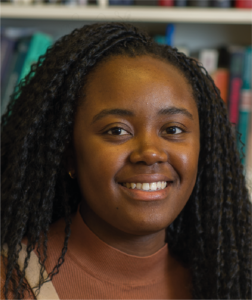 Louisa Brotherson @louisa_geo
Louisa Brotherson @louisa_geo
I am a PhD student in the Liverpool Rock Deformation Laboratory at the University of Liverpool, UK. My research straddles across the disciplines of earthquake seismology and rock deformation, but I am a geophysicist at heart! Using numerical modelling, I aim to understand how earthquakes work on the small-scale using high pressure frictional experiments. I measure seismic waves radiating from tiny, lab-generated earthquakes (stick-slip) which are generated during frictional sliding. Outside the lab, I like to go to as many gigs, concerts and festivals as possible and sometimes, even perform! I am also baking during lockdown and trying to offset all the cakes and bread by strength training at home (I don’t think it’s working…). Proud to be #BlackInSTEM.
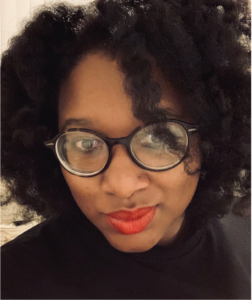 Leiaka Welcome @future_rift_doc
Leiaka Welcome @future_rift_doc
I am a sedimentologist, pursuing my doctorate at the Colorado School of Mines. My research entails assessing the stratigraphic architecture of fluvial deposits in arid continental rifts, using a combination of outcrop data and satellite imagery. I come from the twin-island Republic, Trinidad and Tobago, West Indies. Weekend drives as a child through the fields of Palo Seco, Trinidad, peppered with ice-cream and conversations with my parents about “black gold” ignited my curiosity and spurred my love of all things geology. I am fascinated by all geoscience-related topics, from the actual physical and historical geoscience, to policy and science communication. My Caribbean roots-inspired my love for geology, but I also consider myself a carnival chaser, who likes sharing my West Indian culture by documenting travel, plants, and tea (@thetravelingeo). My experience so far has been an incredible journey, I continue to learn so much about myself as a geoscientist and a person.
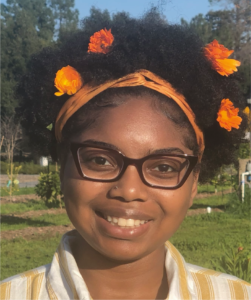 Alexis Wilson @DrAlexisWilson
Alexis Wilson @DrAlexisWilson
I am currently a PhD student in the department of Earth System Science at Stanford University, USA. I study the intersection of soil biogeochemistry, climate change, and environmental justice. I have just begun investigating a variety of questions about soil contamination in urban gardens, specifically in communities of color and/or low-income communities. My passion lies in understanding and combating environmental racism and climate injustices on local and global scales. Through my work I hope to create a more just, sustainable, and equitable world. In my free time I enjoy reading, painting, and spending time with friends and family.
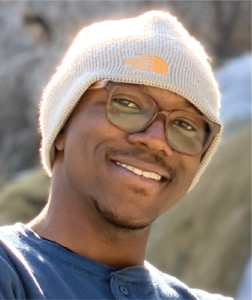 Folarin Kolawole @fracturedfola
Folarin Kolawole @fracturedfola
Hi everyone! I am a PhD geoscientist at the University of Oklahoma, USA. My research is interdisciplinary, and it involves the integration of structural geology, near-surface geophysics, and geomechanics to investigate 1) how rocks break to form new sedimentary basins, and 2) the patterns of intraplate and anthropogenically-induced earthquakes. I am very passionate about promoting racial and gender diversity in the geosciences. Outside of research, I enjoy fishing (still an amateur) and do a lot of rock climbing, both indoors and outdoors. Escaping from research work is tough but I always try to! 😀 Over the years, I had done mostly sport climbing and bouldering. Recently, I attempted trad climbing, and I was mind blown!! I am totally stoked to do more of it… I am also getting my personal rack of climbing cams soon.
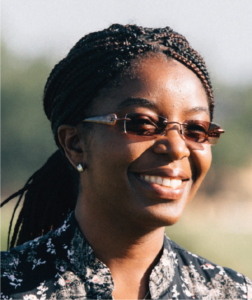 Hendratta Ali @HendrattaAli
Hendratta Ali @HendrattaAli
I am an associate professor at Fort Hays State University. I am Cameroonian, and my geoscience interests are broad. This is perhaps because I grew up in different geologic environments. My elementary school was precariously wobbling on sedimentary terrain, while my high school was dangling dangerously on the flank of an active volcano. Fortunately, my undergraduate days were anchored firmly on metamorphic basement. I work in exploration for petroleum in sedimentary, and groundwater in fractured basement rocks. I also do research in aqueous geochemistry, to investigate how stable isotopes account for the inorganic sources of carbon dioxide released from groundwater, soil, and surface waters to the atmosphere. Outside geoscience, I am an introverted bookworm who enjoys cozy mysteries, with a zest of forensic geoscience. Please send book recommendations my way! I love to dance, because I can’t sing.
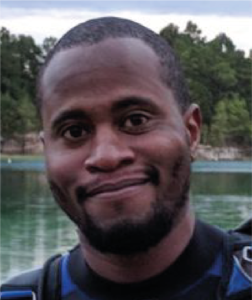 Kieron Prince @drkieronprince
Kieron Prince @drkieronprince
Hi! I’m a recent PhD graduate of Texas A&M University where I studied how the alteration of carbonate sediments changed in response to major climatic and oceanographic events in the Maldives. Before this, I was an MS student at Baylor University, studying what controlled the distribution and quality of an unconventional (shale) reservoir in the Midland Basin. I’m excited to start as an Assistant Professor of Geology at Broward College in Fall 2020. This is a primarily Hispanic-serving institution with a significant Black population and I hope to inspire more underrepresented students to pursue geoscience careers. In my spare time I scuba dive, look for ‘really cool’ rocks with my son or relax with a book.
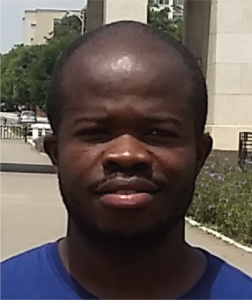 Anthony Osei Tutu
Anthony Osei Tutu
Hi everyone! I am currently a postdoctoral research associate at the University of Arizona, USA. My research interests focus on the dynamics of lithosphere and mantle interaction, and their influence on surface processes. I use numerical methods with data integration to explore geodynamic processes such as lithosphere stresses and topographic evolution. When I am not reading or thinking about geosciences, I spend much of my spare time on modern architecture, watching videos and reading articles. I am particularly fascinated by the cost-effective, green and innovative ways employed in modern designs and the way in which architects merge buildings with their surroundings in different climates for either saving energy or aesthetic purposes.
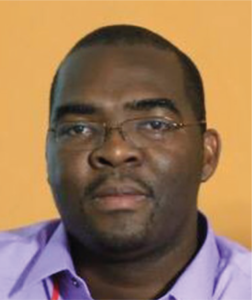 Roby Douilly @R_Douilly
Roby Douilly @R_Douilly
I am an assistant professor in seismology at the University of California Riverside. My curiosity towards geosciences started after experiencing the devastating 2010 Haiti earthquake, which caused heavy damage on both human and material levels. Following this tragedy, I found an opportunity to pursue a career in earthquake seismology. For my work, I focus on the Earth’s crust where my time is partitioned between observational seismology and numerical modelling. I use seismic source imaging techniques to infer tectonic structure in the crust and then investigate how earthquakes propagate through it with rupture models. Outside of research, I am a family man who enjoys sports and plays videogames from time to time.
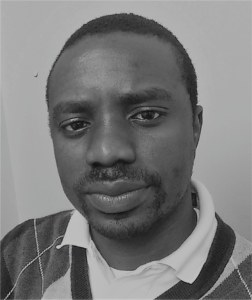 Ayodeji Babalola @InvertMySeismic
Ayodeji Babalola @InvertMySeismic
Hi everyone! I am a senior geophysicist at FracGeo. I obtained a MS and PhD in geophysics at the University of Houston, US. I am passionate about subsurface imaging, and I explore the salient geological information that is hidden in seismic datasets by using inversion methods and statistical principles. It’s a game of hide and seek, and I have gotten pretty good over the years, unraveling these hidden geological insights with a combination of physics and statistics and also good knowledge of the sedimentary basin. What do I do for fun? I love running, keeps the stress level at bay, and, as you can guess… seismic!! sound energy! I enjoy listening to good music. Although I cannot sing, I enjoy helping others sing better by volunteering in the local church as a sound engineer.
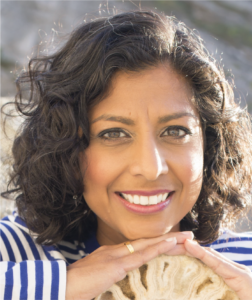 Anjana Khatwa @jurassicg1rl
Anjana Khatwa @jurassicg1rl
Hello! I am an Earth scientist specialising in bringing stories about the origins and formation of natural landscapes to life for a wide range of audiences. For 15 years I worked for the Jurassic Coast World Heritage Site, specialising in developing sustainable education programmes to engage school audiences with geography and Earth science. Now as a freelancer, I work as a consultant to advocate for diversity in nature conservation and the geosciences. I also work as a TV presenter, using these skills to produce fun and engaging Earth Science content for my own YouTube channel. In my spare time I bake a lot of cakes much to the delight of my three children and I recently got a new bike which means that I am out on two wheels again! Living in Dorset means that I also spend time filling my house with fossils that I find on the Jurassic Coast.
Editor’s note: Anjana identifies as a NBPoC. She is a National Diversity Award Nominee for a Positive Rode Model (Race) for campaigning for diversity in the Geosciences and nature conservation. We chose to feature her story here as we believe that her unique career path and commitment to raising and empowering Black voices can be an inspiration for many.
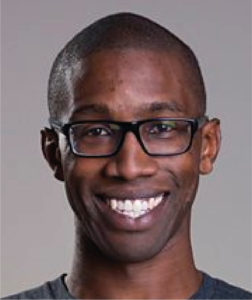 Chris Jackson @seis_matters
Chris Jackson @seis_matters
I am the Equinor professor of basin analysis at Imperial College, London, UK, where I’ve been an academic member of staff for >16 years. I am a member of the Basins Research Group, a multidisciplinary group of Earth scientists studying the geodynamic, structural, and stratigraphic evolution of sedimentary basins. Personally, I am particularly interested in how the Earth’s crust deforms as it is stretched, the landscapes and seascapes that arise, and the way in which sediments are transferred and deposited in response to this deformation. When not studying the evolution of the Earth, I am interested in open access publishing, open science, open data, and the ways in which these things can improve the quality of academic work and, more critically, academic conduct. Finally, I am passionate about equality, diversity, and inclusion, not just in academia, but in society in general.
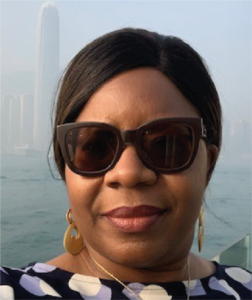 Estella Atekwana @atekwanae
Estella Atekwana @atekwanae
Hi everyone! I am currently the Dean of the College of Earth, Ocean, and Environment at the University of Delaware in the US. While I am primarily an administrator, I still love doing research. My research uses geophysical methodologies to investigate geologic processes spanning from the micron to the lithospheric scale. My biogeophysics research investigates geophysical signatures of microbial-rock interactions. I also work on East African Rift tectonics. Here, I integrate geophysical imaging of shallow basin structures and lithospheric and upper mantle structures to understand the geodynamic processes of continental rift initiation and how preexisting Precambrian structures modulate strain localisation. I enjoy working with and mentoring students and early career scientists. I focus my efforts on being a champion for diversity in the geosciences and capacity building in developing countries. I love to travel, and my research has taken me to several countries. I use this as an opportunity to engage my students in international research so that they can learn about how scientists from different countries conduct research.
Making a start
“But I don’t feel like I know enough to say the right things” – That’s ok. Listen to black stories, learn about their experiences, educate yourself further.
The #BlackLivesMatter and #BlackInSTEM movements continue growing everyday, and there are almost endless possibilities when it comes to getting involved. Racism does not only come from malice but also from obliviousness and lack of awareness. It is for this reason that the very first step, for many of us, can simply be to recognise that we need to continue learning and start actively seeking ways to further educate ourselves. Spend a few minutes of your lunch break reading “Race and racism in the geosciences” by Kuheli Dutt (Nature Geoscience), or watching this TEDx Talk discussing how studying privilege systems can strengthen compassion. Make “13th” the next movie you watch with friends, and take it as an opportunity to openly and honestly discuss race. Comprehensive lists of anti-racist resources such as this one and this one also are good places to start. If you are an avid podcast listener, browse through this playlist for something new. Then, continue moving forward. If you can, donate to freedom funds or bail projects. Demand accountability and concrete action against racism from geoscientific societies and employers. Act against racism and discrimination and encourage those around you to do the same.
Doing our bit
You can read EGU’s statement on equality, diversity and inclusion here. Going forward, we (the EGU GD Blog editorial team) commit to continue to use the blog as a platform to show and promote the diversity of scientists within geodynamics and adjacent disciplines regardless of their race, gender, career-status, religious beliefs, sexuality, disability or age. Don’t hesitate to contact us if you want to share your story.

#BiG_Logo by L Perez Diaz is licensed under a Creative Commons Attribution-NonCommercial-NoDerivatives 4.0 International License.

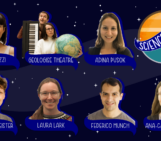
QueenP
So it is true! It is difficult to distinguish black from brown for some people, even for an EGU blog-writer. Interesting.
Anna and Lucia
Dear reader,
Thanks for your comment. Indeed, we have included Anjana, who identifies as a NBPoC. Following your comment, we have clarified our reasons for including her in the post to be fully transparent, and she has herself spoken about it here. We believe that including her strengthens the main message of the post, which is to raise black voices in geoscience.
Best wishes,
Lucia
Kamaldeen
I wonder how you arrived at this list. Chris and Hendratta obviously deserve to be here. This seems like a list of diasporan Geoscientist and it is definitely skewed.
Anna Gülcher / Lucía Pérez-Díaz
Dear reader,
We aimed to showcase a variety of people at different stages of their geoscience career: from students to professionals, both within academia and industry, covering a wide range of experiences and levels of expertise. If there is any bias in the people we have featured, this could only result from our limited circle of acquaintances.
Lucia
Hols
A great article and fab to see! I’d like to see some interviews from people in different industries as well if possible please? I work as an Engineering Geologist and and have noticed a real lack of diversity past higher education.
I am disappointed at some of the comments though, we are professionals after all and yet the comments are written as general social media comments rather than constructive criticism to aid the learning and growth of the geoscience community.
The Curmudgeonly Commenter
Great post!
Anna and Lucia
Thank you!
Terri Plake
“In this blog post we highlight some exceptional researchers in geodynamics and adjacent disciplines who do amazing research as PhDs, postdocs, professors and professionals and who just happen to be black.”
This is an excellent article about these scientists. However, “who just happen to be black?” It seems to me that people don’t “just happen” to be black. These words unintentionally diminish the extra hard work that these scientists no doubt had to put in, to overcome many barriers, and work through implicit racism, that do not exist for white people. Mindfulness of our words.
Anna and Lucia
Hi Terri,
Thanks for your message – indeed, wording is important.
We understand how the sentence you refer to could be read in that way, but please know that this is not our intended interpretation. We do not at all want to minimise or dismiss the extra hard work these scientists had to put in. Ultimately, we believe that the blog post (as a whole) successfully celebrates both the science they do and their personal stories – this is our goal.
Lucia.
Sukanya
A well written post. I believe each of these individuals can bring about a massive change in ways geosciences are perceived around the world and be a role model for future generations. Here in South Africa I have met many African students who have done excellent in Geology. One of them is pursuing a PhD in Physical Volcanology and will probably be the first black Volcanologist of South Africa. Geology should be for everyone irrespective of race or gender.
Iris van Zelst
Hear hear!
Science is (or should be) for everyone!
Jennie
So telling that most of these people are still students (PhD or post-doc) or researchers (typically paid less than minimum wage). So few being hired as professors or professional geologists. Highlights the problem even more!
BCN
I am a base metal exploration geologist from southern Africa working in my home country. It’s nice to see names and faces of other African geologists working in different parts of the world.
In our quest to being more “conscience” let’s not lose our compassion.
Anna and Lucia, you are doing a great job of managing the responses to the comments.
I don’t come across posts like this often/ever. Thanks.